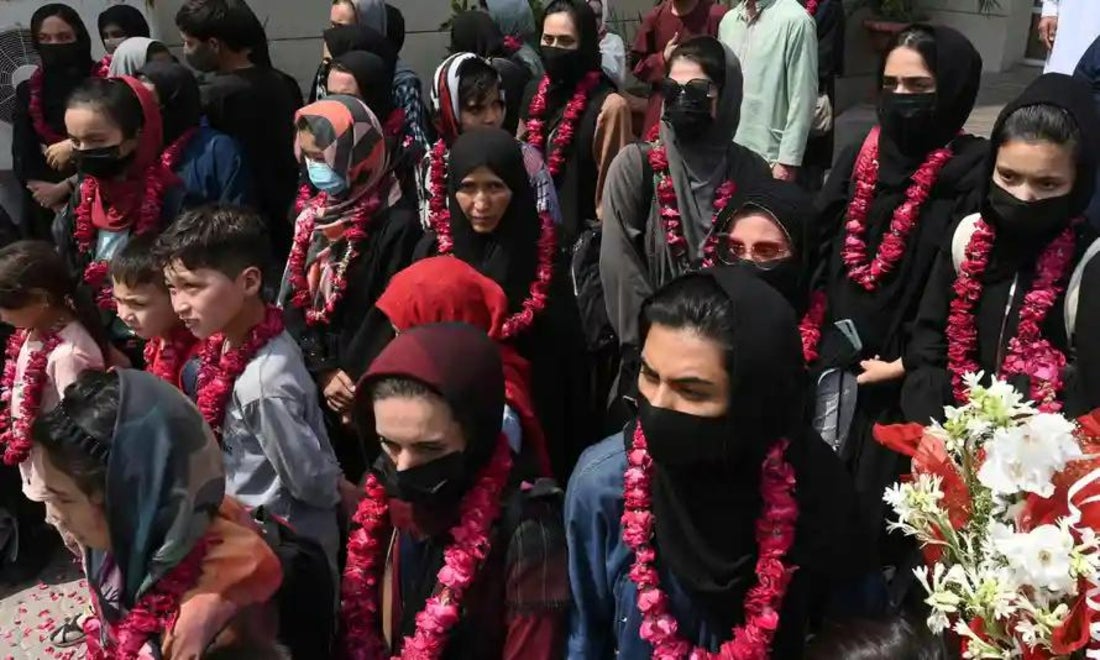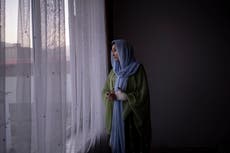Afghan girls from youth football team who escaped Taliban ‘haven’t got any’ home in UK
Exclusive: ‘They need just not a new home but they need a new home where they can continue to be a team,’ says Human Rights Watch

Girls from the Afghan national youth football team and their families, who escaped the Taliban, face being stuck in temporary accommodation or split up because a council says it can’t rehouse them all.
A leaked email from Khalida Popal, the former Afghanistan women’s team captain, suggests Leeds City Council is refusing to provide accommodation for all 132 Afghans in the group, which includes 32 teenage football players, their families, coaches and other staff.
It comes after The Independent revealed in early September that the girls were stranded in Afghanistan, and then later in month that Pakistan would allow them to enter the country on temporary visas.
Leeds United chairman, Andrea Radrizzani, said his football club would “give the girls a prosperous and peaceful future” as he offered to put all the players on its youth development teams — but the govermnent and local authorities are already trying process thousands of refugees since Afghanistan fell to Taliban control in August.
In the leaked email, Ms Popal states: “If Leeds Council cannot host all 132 people we need to find other clubs, foundations, universities and split the team, so far we haven’t got any.”
A source closely involved in helping the girls, the youngest of whom is just 12 years old, said: “They have already had the trauma of fleeing the Taliban and then now they face disruption. It is sad they have to break up the group because they know each other so well and get on so well. It is frustrating.
“They have been late arriving to the UK partly due to struggles to find them long-term accommodation here.”
The girls and their families are expected in Britain on Thursday, flying from Pakistan to Birmingham where will be put into quarantine hotels for up to two weeks.
Leeds City Council denied claims it would only house five of the girls, but refused to say how many it will accommodate.
A spokesperson for Leeds City Council said: “Leeds is fully committed to accommodating Afghan refugees and a large number of families have already been accommodated in the city.
“However, the issues affecting all Afghan refugees, including those involved in women’s football, are complex and we continue to work with government and other partners to address the challenges faced.”
Initial efforts to evacuate the girls to Doha did not work as they were blocked from getting to Kabul airport because of the ongoing terror threat. The girls were trapped in hiding from the Taliban in Kabul for another 10 days before gaining temporary visas to go into Pakistan.
Kashif Siddiqi, a London-born footballer who played for Pakistan’s international team, has spearheaded the campaign to get the squad and their loved ones over to Britain. Mr Siddiqi, who co-founded Football for Peace, is currently in Islamabad alongside Ms Popal to help plan the girls’ imminent journey to the UK.
Ms Popal told The Independent: “The girls have been through a lot. They have had a very, very tough journey. They have been through a lot of stress and risk - hiding them in a hostel in Kabul and being displaced from their homes.
“Their life was in danger not just from the Taliban but from men in the community. I am very thankful to the UK for saving their dreams and lives. I cannot wait to see them breathing freedom and practising basic human rights.”
Ms Popal, who was forced to escape Afghanistan in 2011 because helping set up the national women’s football team had put her life in danger, said women’s football in Afghanistan is based on activism and shining a light on the “social and cultural challenges” women face.
“We were standing to say we are half of the population, you cannot take our rights. We are standing against Taliban ideology. We were at great risk not just for playing football but for activism,” she said.
“It’s quite sad and disappointing that only a handful of Afghan refugee girls from the national football team and their families were assisted, especially when they just faced the darkest moments of their lives.”
Heather Barr, of Human Rights Watch, said it is “wonderful” the girls have escaped and are due to travel to the UK but warned they need support once they arrive.
She added: “Women’s sports is not going to exist in Afghanistan in coming months and likely years. It would be really important for Afghan women’s sports to stay alive outside the country. They need just not a new home but they need a new home where they can continue to be a team.
“I hope there is support for them wherever they go. We are seeing more and more how much trauma they are going have to carry with them. They are going to be wonderful members of whatever community they join.”
The Taliban recently declared Afghan women would be blocked from taking part in all sports. While Ms Popal advised players to burn their football kits and actively get rid of photos of them playing on social media to stop them from possibly being punished by the authorities there.
The Taliban swept to power in mid-August as the US and British forces withdrew. The last time the hardline Islamist group ruled the country women were barred from working, girls were blocked from going to school, and women had to be chaperoned by a male relative if they wanted to leave the house.
Chris Thomas, founder of Football for Humanity, told The Independent: “It’s quite sad and disappointing that only a handful of Afghan refugee girls from the national football team and their families were assisted, especially when they just faced the darkest moments of their lives.
“We are quick to criticise those nations who had not stretched beyond limits to help these people, yet it seems difficult to ask for ‘the extra mile’ even in our homeland. Perhaps it’s a reflection of our lack of understanding of the Afghan situation, and it demonstrates how difficult it is for us to empathise with those who are helpless and suffering.”
A spokesperson for the Home Office said: “It is wrong to suggest the Afghanistan girls football team are facing homelessness. Like others we have brought to the UK from Afghanistan, they will receive a warm welcome, support and accommodation.
“The government is committed to doing all it can to support those most in need, including vulnerable women and girls at risk who have had to flee Afghanistan.”
It was unclear if the girls were being resettled as part of the govermnent’s Afghan Relocations and Assistance Policy (ARAP) scheme, and the Home Office declined to say.
Join our commenting forum
Join thought-provoking conversations, follow other Independent readers and see their replies
Comments




Bookmark popover
Removed from bookmarks